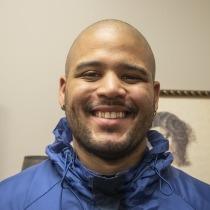
Jean Luis Suazo Betancourt
After you graduate, what is your next adventure?
After I receive my master's, I will go back to studying for my quals in January. I'll hold off celebrating until I pass. After the quals, I will go back to work in Dr. [Mitchell] Walker's lab, where I will be working toward a doctorate.
What about your next adventure are you most looking forward to?
It'll be good to get the chance to do more research on electric propulsion. I'll be using laser diagnostics to study Hall Thruster plasma and I'll be working with [fellow grad student] David Jovel -- someone who definitely pushes and challenges me in ways that maximize my learning. I look forward to working with him. The most exciting part is finding some interesting problems that can be tackled with the capabilities we have developed in the [High Power Electric Propulsion] lab. I'll be using what I've already learned to come up with really interesting questions to answer in my doctoral research.
Did you have any previous co-op, internship, or research experience in this area?
I received a GEM [Graduate Degrees for Minority Engineers] scholarship that has paired me with the Aerospace Corporation, where I worked in the performance modeling group my first summer in graduate school. I'm still working for them eight hours a week, remotely. My research has been with Dr. Walker and Dr. [Adam] Steinberg, focusing on the initial development of the Thomson Scattering Diagnostic System.
How did your educational experience at Georgia Tech help you to achieve your goals?
Georgia Tech is a very challenging place, both academically and intellectually. Academically, courses I've taken here have been some of the most impactful courses I've ever taken. They've been well-developed and crafted to get the most out of me. Intellectually, people here do not stop until they've developed some depth of understanding. It's expected that you really think about what you're learning. And it's humbling to be around really smart people who are still willing to get something wrong so that they can better understand how to get it right. At Tech, it's not enough getting the right answer; you want to be able to explain why it's right. That's why a lot of us came to Tech, to become good thinkers, to be curious about how and why something is right.
What advice would you give to an underclassman who would like to follow the same path?
The Ph.D. journey is very personal. It goes by very fast, especially the first year, but it can really slap you around the place, so you need to steady yourself. You need to not be afraid of the changes it's going to make in you, because no one here is going to get away without having to acclimate to something. Maybe you always had the highest grades as an undergraduate or you were the smartest person in the class. That won't be the case here. It's crazy because, no matter how good you are -- and we are all good, because we got into Tech-- the expectations are higher. Think more about asking the best question rather than having the right answer. And follow the advice of your advisor. He or she won't be putting challenges or tasks in front of you that you can't do. Their job is to help you succeed, professionally, academically, and intellectually.